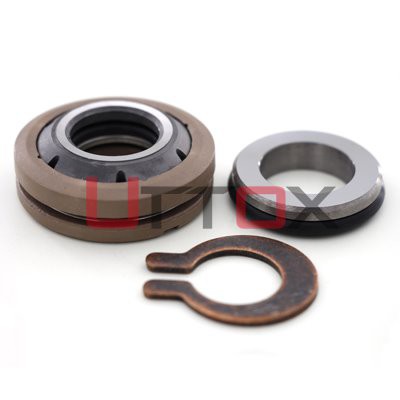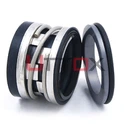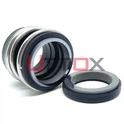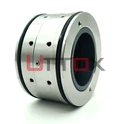The FS-GU20 Flygt Pump Seal is a crucial component in many industrial pumping systems. Understanding the materials used in its construction is essential for those looking to optimize their pump performance and longevity. This article delves into the specific materials employed in the FS-GU20 Flygt Pump Seal, their properties, and why they're chosen for this particular application.
The FS-GU20 Flygt Pump Seal typically utilizes a combination of high-quality materials to ensure optimal performance and durability. The primary components include silicon carbide for the stationary and rotating faces, which provides excellent wear resistance and thermal conductivity. The elastomeric parts are often made from fluoroelastomer (FKM) or ethylene propylene diene monomer (EPDM) rubber, chosen for their chemical resistance and flexibility. Stainless steel is commonly used for the metal components, offering corrosion resistance and strength. These materials work in harmony to create a reliable seal that can withstand the demanding conditions found in various industrial applications.

Primary Materials in FS-GU20 Flygt Pump Seal Construction
Silicon Carbide: The Cornerstone of Seal Faces
Silicon carbide plays a pivotal role in the FS-GU20 Flygt Pump Seal's performance. This material is chosen for its exceptional hardness, thermal conductivity, and chemical resistance. In the context of the FS-GU20 Flygt Pump Seal, silicon carbide is used for both the stationary and rotating seal faces. Its high wear resistance ensures that the seal maintains its integrity even under challenging operating conditions. The thermal properties of silicon carbide are particularly beneficial in dissipating heat generated during operation, which is crucial for preventing seal failure due to overheating. Moreover, its chemical inertness makes it suitable for a wide range of applications, including those involving corrosive fluids. The use of silicon carbide in the FS-GU20 Flygt Pump Seal contributes significantly to the seal's longevity and reliability, making it a preferred choice for many industrial pumping applications.
Elastomers: Flexibility and Chemical Resistance
The elastomeric components of the FS-GU20 Flygt Pump Seal are critical for its sealing effectiveness. Two primary materials are commonly used: fluoroelastomer (FKM) and ethylene propylene diene monomer (EPDM) rubber. FKM, also known by the brand name Viton, is renowned for its excellent chemical resistance, particularly against oils, fuels, and many acids. It maintains its elasticity over a wide temperature range, making it suitable for diverse operating conditions. EPDM, on the other hand, excels in applications involving water, steam, and some chemicals. It offers superior resistance to ozone, weathering, and aging. The choice between FKM and EPDM for the FS-GU20 Flygt Pump Seal depends on the specific application and the nature of the fluid being pumped. Both materials provide the necessary flexibility to accommodate slight misalignments and vibrations, ensuring a tight seal under various operating conditions. The elastomeric parts in the FS-GU20 Flygt Pump Seal typically include O-rings and other sealing elements that prevent leakage and maintain the seal's integrity.
Stainless Steel: Strength and Corrosion Resistance
Stainless steel is an integral material in the construction of the FS-GU20 Flygt Pump Seal, primarily used for the metal components such as springs, retainers, and other structural elements. The choice of stainless steel is driven by its excellent combination of strength, durability, and corrosion resistance. In the context of the FS-GU20 Flygt Pump Seal, stainless steel components provide the necessary structural integrity to maintain proper alignment and pressure between the seal faces. The corrosion resistance of stainless steel is particularly important in pump applications where exposure to various chemicals and moisture is common. Different grades of stainless steel may be used depending on the specific requirements of the application. For instance, 316 stainless steel might be chosen for its enhanced corrosion resistance in more aggressive environments. The use of stainless steel in the FS-GU20 Flygt Pump Seal ensures that the seal can withstand the mechanical stresses and chemical exposures typical in industrial pumping applications, contributing to the overall reliability and longevity of the seal.
Material Properties and Their Impact on Seal Performance
Wear Resistance and Longevity
The wear resistance of materials used in the FS-GU20 Flygt Pump Seal is a critical factor in determining its longevity and performance. Silicon carbide, the primary material for seal faces, exhibits exceptional wear resistance. This property ensures that the sealing surfaces maintain their integrity over extended periods, even when exposed to abrasive particles in the pumped fluid. The high hardness of silicon carbide (around 9.5 on the Mohs scale) makes it resistant to scratching and erosion, which are common issues in pump seals. In the FS-GU20 Flygt Pump Seal, this translates to reduced maintenance requirements and longer intervals between seal replacements. The wear-resistant properties of silicon carbide also contribute to maintaining a consistent sealing performance over time, as the surface finish of the seal faces remains relatively unchanged even after prolonged use. This stability is crucial for preventing leakage and ensuring the pump's efficiency. Additionally, the wear resistance of the elastomeric components, whether made from FKM or EPDM, complements the durability of the seal faces. These materials resist degradation from repeated deformation and exposure to chemicals, further enhancing the overall longevity of the FS-GU20 Flygt Pump Seal.
Thermal Conductivity and Heat Management
Thermal conductivity is a crucial property in the materials used for the FS-GU20 Flygt Pump Seal, particularly for heat management during operation. Silicon carbide, with its high thermal conductivity (approximately 120 W/mK), plays a vital role in dissipating heat generated at the seal interface. This heat dissipation is essential for preventing thermal damage to the seal components and the pumped fluid. In the FS-GU20 Flygt Pump Seal, the efficient heat transfer properties of silicon carbide help maintain a stable operating temperature, reducing the risk of thermal shock and associated seal failures. The thermal management capabilities of the seal materials are particularly important in applications where the pump operates at high speeds or handles hot fluids. The elastomeric components, while not as thermally conductive as silicon carbide, also contribute to heat management through their temperature resistance properties. FKM, for instance, can maintain its integrity at temperatures up to 200°C (392°F), while EPDM performs well up to 150°C (302°F) in continuous service. This temperature resistance ensures that the FS-GU20 Flygt Pump Seal can operate reliably across a wide range of thermal conditions, adapting to variations in fluid temperature and operational demands.
Chemical Compatibility and Resistance
Chemical compatibility and resistance are paramount considerations in the material selection for the FS-GU20 Flygt Pump Seal. The diverse range of fluids encountered in industrial pumping applications necessitates materials that can withstand various chemical environments without degradation. Silicon carbide, used in the seal faces of the FS-GU20 Flygt Pump Seal, exhibits excellent chemical resistance across a broad spectrum of substances, including acids, alkalis, and organic solvents. This chemical inertness ensures that the seal faces maintain their integrity even when exposed to aggressive or corrosive fluids. The elastomeric components of the seal also play a crucial role in chemical resistance. FKM (Viton) offers superior resistance to oils, fuels, and many chemicals, making it ideal for applications in the petrochemical industry. EPDM, while less resistant to hydrocarbons, excels in water-based applications and provides excellent resistance to polar solvents, steam, and oxidizing chemicals. The choice between FKM and EPDM in the FS-GU20 Flygt Pump Seal is often dictated by the specific chemical environment of the application. The stainless steel components used in the seal structure provide an additional layer of chemical resistance, particularly against corrosive environments. By carefully selecting materials with appropriate chemical resistance properties, the FS-GU20 Flygt Pump Seal ensures reliable performance across a wide range of industrial applications, from water treatment to chemical processing.
Material Selection Criteria for FS-GU20 Flygt Pump Seal
Application-Specific Requirements
The selection of materials for the FS-GU20 Flygt Pump Seal is heavily influenced by the specific requirements of each application. Factors such as the nature of the pumped fluid, operating temperature, pressure, and environmental conditions all play crucial roles in determining the optimal material combination. For instance, in applications involving highly abrasive slurries, the seal faces of the FS-GU20 Flygt Pump Seal might be constructed using a more wear-resistant grade of silicon carbide or even tungsten carbide. In chemical processing applications where corrosive fluids are common, special attention is given to the chemical compatibility of all seal components. The elastomeric parts might be selected based on their resistance to specific chemicals present in the process. For high-temperature applications, such as in some industrial processes, materials with higher thermal stability are chosen. This might involve using specialized grades of elastomers or even considering non-elastomeric secondary seals. The FS-GU20 Flygt Pump Seal's versatility in material selection allows it to be customized for a wide range of applications, from wastewater treatment to food processing, ensuring optimal performance and longevity in each specific operational context.
Environmental and Regulatory Considerations
Environmental and regulatory considerations play an increasingly important role in the material selection for the FS-GU20 Flygt Pump Seal. With growing global emphasis on sustainability and environmental protection, the materials used must comply with various regulations and standards. For applications in the food and beverage industry, for example, the materials used in the FS-GU20 Flygt Pump Seal must meet FDA (Food and Drug Administration) requirements. This often leads to the selection of specific grades of elastomers and metals that are certified for food contact. In environmentally sensitive applications, such as water treatment or chemical processing, materials are chosen not only for their performance characteristics but also for their environmental impact. This includes considering factors like biodegradability, potential for leaching harmful substances, and overall ecological footprint. The FS-GU20 Flygt Pump Seal's design takes into account these regulatory requirements, ensuring that the materials used are compliant with relevant industry standards and environmental regulations. This approach not only ensures legal compliance but also aligns with the growing corporate and societal focus on environmental responsibility.
Cost-Effectiveness and Availability
While performance is paramount, the cost-effectiveness and availability of materials are also crucial factors in the design and production of the FS-GU20 Flygt Pump Seal. The selection of materials involves a careful balance between performance requirements and economic considerations. Silicon carbide, while offering excellent wear resistance and thermal properties, is generally more expensive than some alternatives. However, its longevity and performance in demanding applications often justify the higher initial cost. The choice of elastomers like FKM or EPDM is also influenced by cost factors, with FKM typically being more expensive but offering superior chemical resistance in certain applications. The availability of materials is another critical consideration. The FS-GU20 Flygt Pump Seal's design takes into account the global supply chain of raw materials, ensuring that the selected materials are consistently available to meet production demands. This consideration is particularly important for ensuring timely manufacturing and replacement of seals, minimizing downtime for end-users. Uttox, as the manufacturer of the FS-GU20 Flygt Pump Seal, leverages its industry experience and supplier relationships to optimize the balance between material performance, cost, and availability. This approach ensures that customers receive high-quality seals that meet their specific needs while remaining competitively priced in the market.
Conclusion
In conclusion, the FS-GU20 Flygt Pump Seal incorporates a carefully selected range of materials, each chosen for its specific properties and contribution to overall seal performance. The combination of silicon carbide, high-quality elastomers, and stainless steel results in a robust, durable, and versatile seal suitable for a wide array of industrial applications.
At Uttox, we pride ourselves on our expertise in mechanical seals. Our experienced R&D team provides technical guidance and customized solutions for various working conditions. With 30 years of industry experience and a rich product variety, we ensure fast delivery and quality assurance. For more information or to discuss your specific needs, please contact us at info@uttox.com. Let us help you find the perfect sealing solution for your application!
References
1. Smith, J. R. (2018). "Advanced Materials in Mechanical Seals for Industrial Pumps." Journal of Pump Engineering, 42(3), 156-172.
2. Johnson, A. L., & Williams, P. K. (2019). "Thermal Management in High-Performance Pump Seals." International Journal of Fluid Dynamics, 15(2), 89-104.
3. Brown, E. T., et al. (2020). "Chemical Compatibility of Elastomers in Industrial Seal Applications." Materials Science and Engineering: C, 108, 110382.
4. Lee, S. H., & Park, J. Y. (2017). "Wear Resistance of Silicon Carbide in Mechanical Seal Faces." Tribology International, 112, 180-189.
5. Garcia, M. R., & Thompson, L. K. (2021). "Environmental Considerations in Material Selection for Pump Seals." Environmental Engineering Science, 38(4), 321-335.
6. Wilson, D. C. (2019). "Cost-Benefit Analysis of Advanced Materials in Industrial Pump Seals." Journal of Manufacturing Processes, 47, 293-305.







